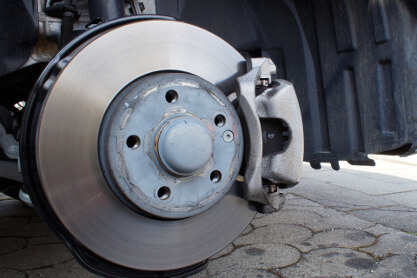
Your brakes are one of the most important components of your car. They are designed to keep you safe, slow you down, and stop – avoiding collisions and accidents. So it is important to keep them properly maintained and ensure they are in good working order at all times. It is also wise to take your vehicle in to your mechanic for a check at the first sign of trouble. With winter upon us, your brakes become ever more important as driving conditions become more challenging. This month we look at them in a little more detail: what the key components are, how they work, and how to avoid brake problems.
The key components of disc brake systems
There are a number of key components to your car’s braking system, and they include:
- Brake pads
- Rotors
- Callipers
- Brake fluid
Brake pads
These will ensure smooth slowing down and stopping so it is important to be aware of what state they are in. Given what they do, they will wear down over time and if you are braking with worn-down brake pads you could end up damaging your rotors as well, which is a much more expensive repair job. Get your brake pads checked at every annual service as a minimum, and change them as often as necessary – they are relatively inexpensive.
Rotors
Rotors are the heart of the braking system and should be checked regularly to ensure they are not damaged. A worn rotor will increase your stopping distance and can overheat, compromising your ability to brake safely and in good time. Whenever you are replacing your brake pads, make sure that your rotors are also checked for any damage. If you are replacing them, don’t be tempted to choose a cheaper version – this is one thing to spend money on. Cheaper versions are more likely to overheat faster and warp sooner which will mean you have to replace your rotors again sooner.
Callipers
An important element of the braking system, callipers can and do get damaged over time. If you notice a burning smell when braking then ask your mechanic to check your brake system and the callipers in particular. At the first sign of trouble, it is worth the investment to get them replaced before they lead to further damage to rotors or other brake components. If you find that you do have to replace the callipers make sure that the brake pads are also replaced and that the brake fluid system is checked as that may need to be changed too.
Brake fluid
Brake fluid is a hydraulic liquid that helps to transfer the force you create by pressing on the brake through the braking system and on to the wheels making the vehicle stop. It has a high boiling point to deal with the heat that is created through this process and to keep it from freezing in the winter, and it helps to prevent corrosion. However, by its nature it is also a hygroscopic liquid, which means that it attracts water. This can cause it to become watered down over time, reducing its effectiveness. Ensure it is checked from time to time and if necessary have the system flushed, cleaned, and replaced to ensure your braking system is in good working order.
If you are worried about your brakes or it’s time for a check or service get in touch with our Bromley Vehicle Test Centre team and we will look after you. Either drop in or give us a call on 020 8460 6666 to book an appointment.
